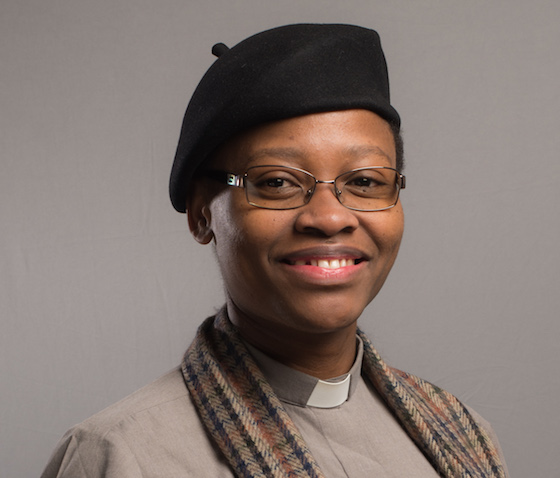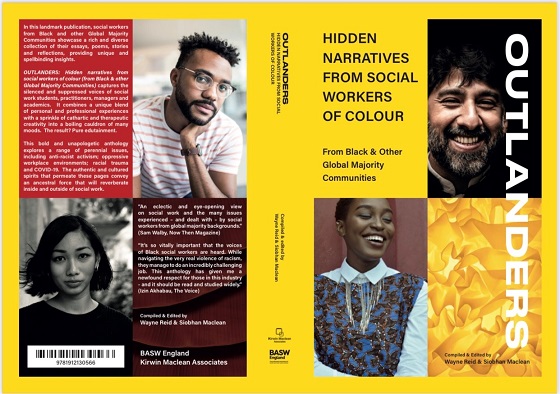When people watch the DMU Gospel Choir sing, the joy and happiness they bring puts a smile on everybody’s face.
Under the guidance of choir leader Ellah Kandi, the singers have performed for the Royal Family and Leicester City, toured the country as backing singers for legendary Leicester rockers Kasabian, stirred emotions for thousands of DMU students at their graduation ceremonies and even reached the semi-final of Britain’s Got Talent, with a thumbs up from Simon Cowell on the way.
But in a new book published this month, Ellah, who has graduated from DMU with a degree in Social Work and is completing a Master’s, reveals how her path to success was tougher than anyone could imagine.

Behind her current commitment to helping others, through song and social work, is a story of someone who fought for 12 years to win the right to asylum, while overcoming challenges that would leave most of us broken.
She hopes that sharing her story more widely in the book ‘OUTLANDERS: Hidden Narratives from Social Workers of Colour’ will inspire others to succeed.
Ellah said: “In my darkest days I kept on reminding myself that there is good in the world - but sometimes you have to search for it. If you can find it, it is like a beacon of light guiding you to the start of a new journey of hope.
“Sharing a story like this may motivate others to do the same, and so on, and so on, until we are motivating entire communities. You need that history and those experiences to learn from and in turn to help enrich other people’s lives.”
Ellah arrived in Leicester after fleeing from Zimbabwe. The story is complicated, but her father’s work in politics during the reign of Robert Mugabe meant it was no longer safe for Ellah to live in her homeland.
Ellah was given refugee status and was holed up with hundreds of others in the notorious International Hotel at the bottom of Leicester’s Humberstone Gate. She says it is hard to remember how many fellow asylum seekers lost hope. With a ban on seeking an education or employment and living on £10 a week in a run-down building, life was grim. Ellah recalls several fellow asylum seekers committing suicide because they could not go on.
Ellah made connections with the DMU Square Mile scheme, a precursor to DMU Local, and started to integrate herself into communities via the Open Faith network and #HealthyDMU. She also joined the DMU Gospel Choir and the associated Emmanu-EL Apostolic Church in Saffron Lane.
The International Hotel was eventually shut down, leaving many homeless, and Ellah was taken in by fellow church members to save her from the streets. Still unable to work Ellah recalls starting an allotment to grow food to give away to those in need. The racism she and others faced at the time was shameful.
“We wanted to grow food all year round to give away to people who needed it. It was the equivalent then to the food banks now except we had to grow everything”, Ellah explains.
“Sometimes when I went to work on the allotment people would be horrible and tell me to go and get a proper job. I said I would love to but I am not allowed. Then others told me to get an education and I told them I would love to but I was not allowed.
“Here I was making myself useful and trying to help the community and people just saw me as a Black African and made no attempt to try to understand my situation.”
A further challenge was claiming the £10 a week given to refugees. People in Leicester had to register weekly at the Charles Street Police Station but it too was closed won. The only option to continue to register and qualify for £10 to spend on food and water was to travel to Loughborough. £10 a week did not buy a bus or train ticket so many had no option but to walk the 18-mile round trip each week. Ellah’s church friends offered lifts to those they could.
All the time, Ellah continued to fight for asylum.

“It was tough when I met up with the immigration authorities”, she says. “I was having to tell my story and go through my experiences over and over again with so many different people who I think could have resolved issues far more quickly if only they had spoken to each other and shared information.
“I met with people that used technical terms I did not understand. Okay. I spoke English but I spoke English in Zimbabwe and I was not offered a translator to explain what they meant. That in itself delayed my application process.”
After 12 years Ellah was finally granted asylum and immediately enrolled on a Social Work course at DMU.
“My piece in the book looks at ways of dealing with this long wait and the ways I empowered myself. It was 12 years of not being able to work or get an education.
“People around me were losing hope every day. I kept on telling myself I cannot lose hope.
“Once my asylum was granted I went into education and developed. Things took a turn for the better because of the groups I joined in the university. Square Mile and the DMU Gospel Choir meant I volunteered with different people from different countries speaking different languages. That sense of inclusion and diversity helped me empathise and I turned my own experiences into a strength.
“Having gone through such a rough time I became a part of a community that embraced and celebrated my experiences.
“Despite what goes on around us there is always hope. There are people around us who can support us. I came up against resistance but my persistence changed all of that.
“The choir plays a big part in my life and I can equate it to my struggles. To sound great, the choir needs harmony. To do that we need the tenors and the altos and the sopranos all working together. If the world works in harmony we will live in a better place.”
You can read Ellah’s story in the book,
published by BASW England.
Posted on Monday 29 March 2021